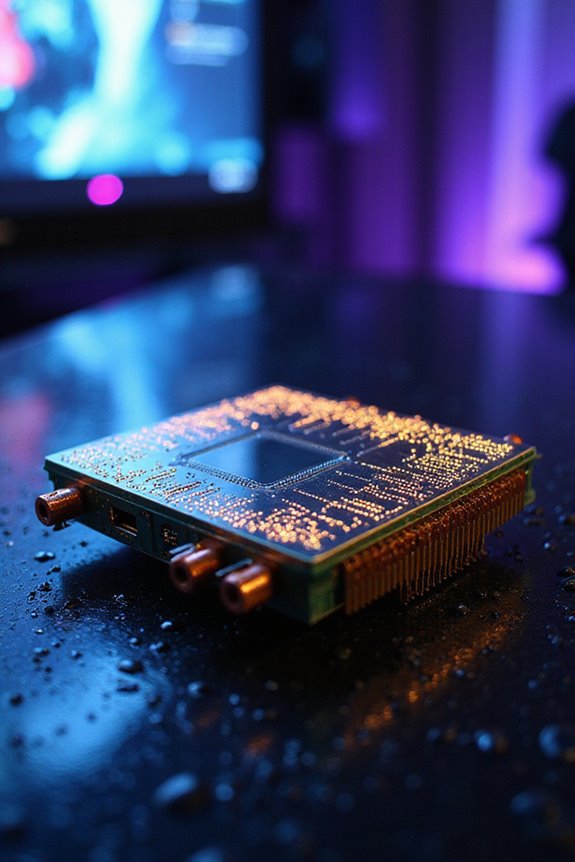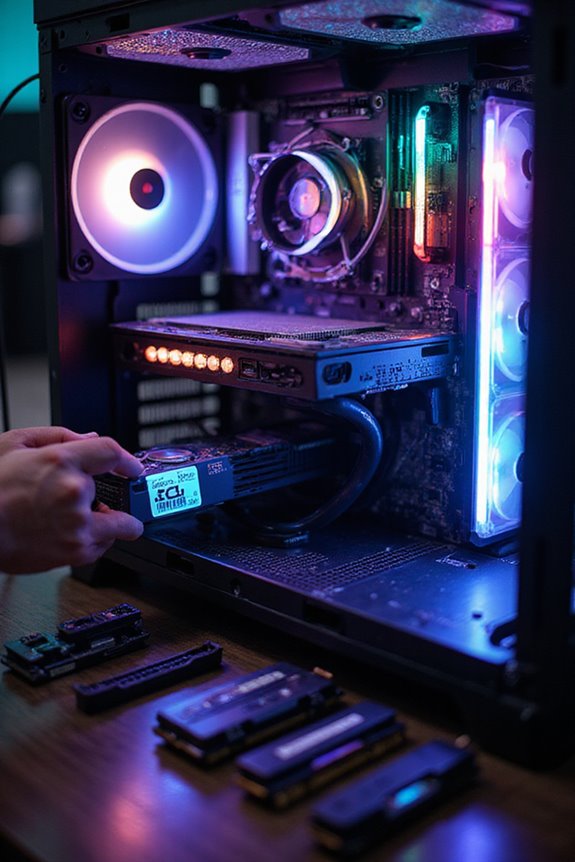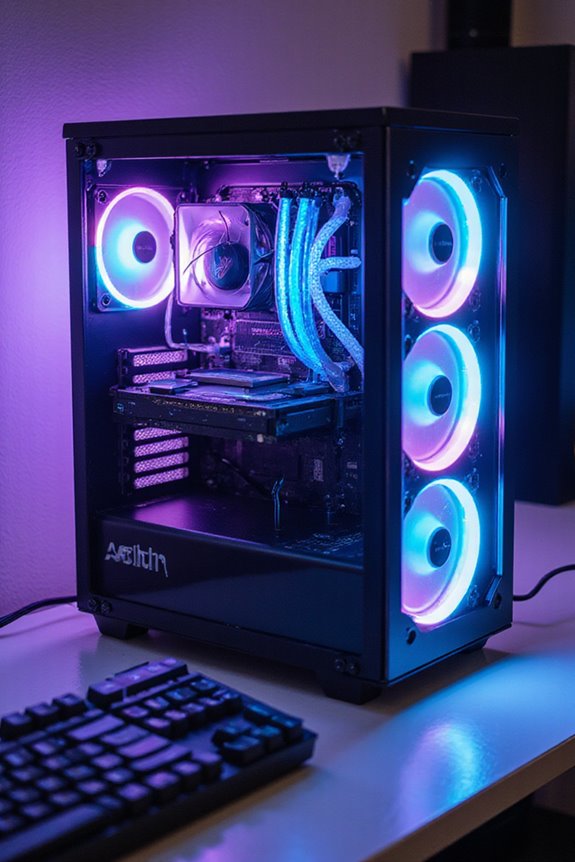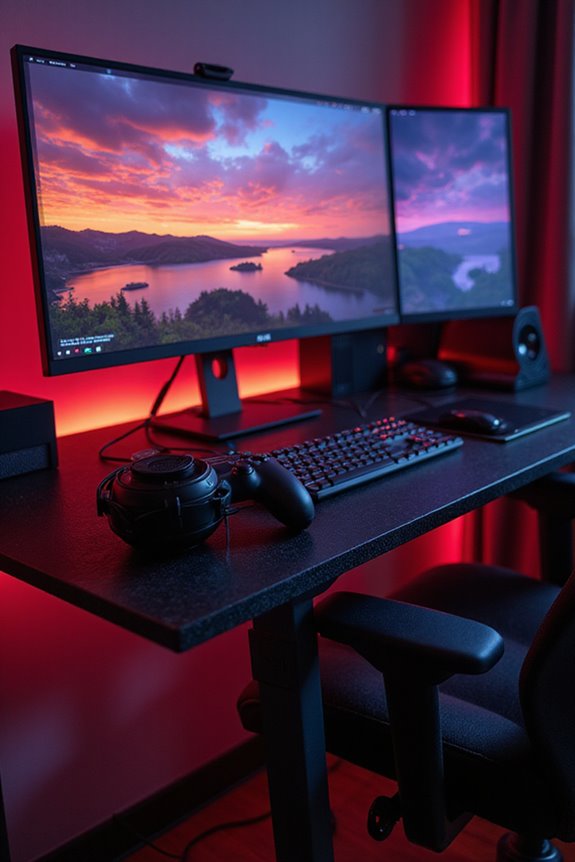If you’re looking for powerhouse CPUs that truly revolutionize gaming performance, AMD’s X3D technology is a game changer. The Ryzen 9 9950X3D, with 16 cores and 32 threads, crushes Intel’s competition, showing 37% faster speeds in 1080p gaming. Plus, it efficiently manages heat with a balance TDP of 170W. Even the Ryzen 7 7800X3D offers amazing value with its 8 cores and boosts up to 5.0 GHz. Want to learn more about these incredible options?
Key Takeaways
- AMD’s Ryzen 9 9950X3D features 16 cores and 32 threads, delivering exceptional performance in 1080p gaming scenarios, outperforming Intel’s offerings.
- The Ryzen 7800X3D, with 8 cores and 16 threads, provides excellent value, often surpassing pricier Intel processors in gaming performance.
- AMD’s 3D V-Cache technology enhances cache memory access speeds, significantly reducing data retrieval wait times for gamers.
- Intel’s Core i5 series offers solid gaming performance at lower prices, with overclocking support for enhanced efficiency in modern titles.
- AMD excels in multi-threaded tasks, making it a top choice for gamers who also engage in video editing and 3D rendering workloads.
The Rise of AMD’s X3D Technology
As I plunge into the rise of AMD’s X3D technology, it’s clear that this innovation marks a significant shift in CPU design. The 3D V-Cache technology enhances cache memory, which is stacked vertically, allowing for faster data access. This means less time waiting for data, and more time playing. The X3D processors, like the Ryzen 7800X3D, offer improved thermal management, keeping things cool while handling demanding tasks.
Sure, the base frequency is slightly lower to manage heat, but that doesn’t take away from the drastic performance boost. It’s tailored for gamers, providing a competitive edge without breaking the bank. With AMD leading the charge, this architecture could shape the future of gaming CPUs, and I’m here for it.
Unmatched Gaming Performance: Ryzen 9 9950X3D
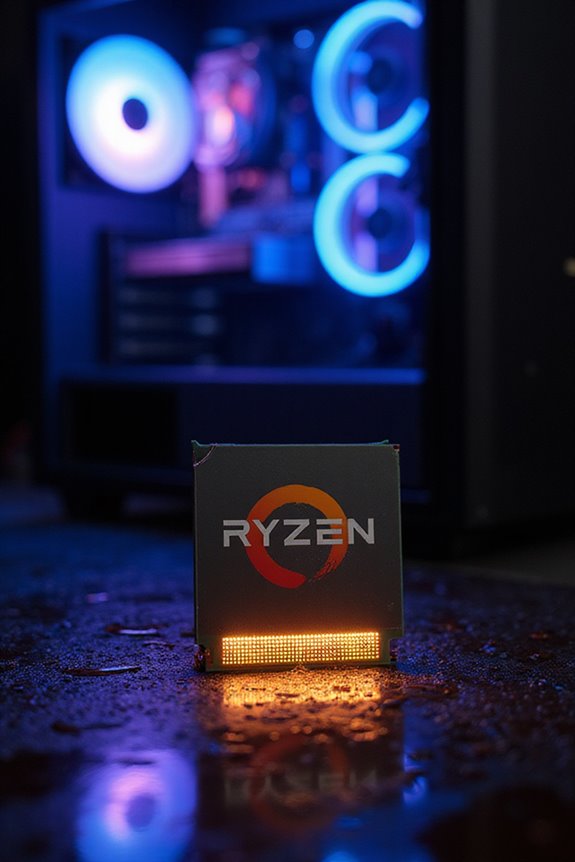
When it comes to gaming, the Ryzen 9 9950X3D truly stands out, showcasing AMD’s commitment to performance. With 16 cores and 32 threads, it handles multitasking like a champ, making it perfect for both gaming and productivity. It’s 37% faster than the Intel Core i9-285K in 1080p gaming, delivering impressive frame rates even in demanding titles.
The second-generation 3D V-Cache technology boosts cache efficiency, enhancing gameplay without increasing power consumption. Plus, it maintains a solid 170W TDP, striking a balance between performance and thermals. While it’s positioned as a premium option at $699, the performance gains justify the investment. Overall, the Ryzen 9 9950X3D is a worthy choice for any serious gamer looking to elevate their experience.
Budget-Friendly Gaming Solutions: Intel Core I5 Series
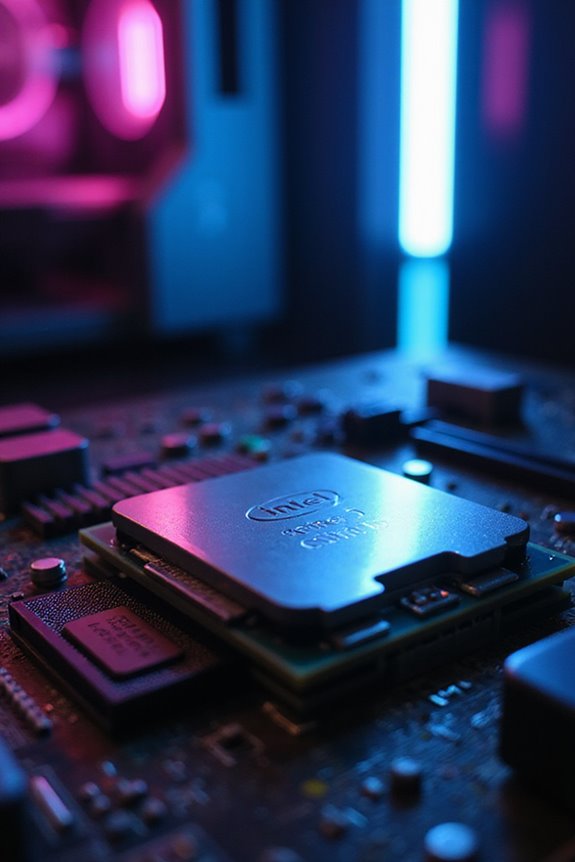
After exploring the powerhouse performance of the Ryzen 9 9950X3D, it’s time to contemplate options that won’t break the bank. The Intel Core i5 series, especially the i5-13600K and i5-14600K, strikes a solid balance between price and performance. With base clock speeds around 3.5 GHz and boosts up to 5 GHz, they handle modern games at high settings quite well. While they may not match the raw power of i7 processors, they deliver impressive gaming performance, making them ideal for both esports and AAA titles. Plus, with lower power consumption and overclocking support, they’re an efficient choice. Pairing an i5 with a good GPU can elevate your gaming experience without emptying your wallet.
Multi-Threaded Workloads: AMD vs. Intel
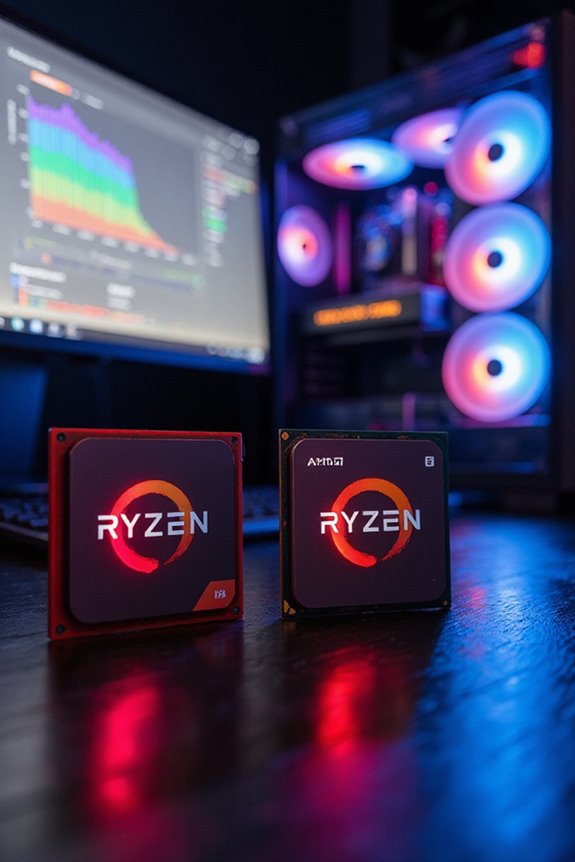
While it’s tempting to focus solely on gaming performance, the world of multi-threaded workloads reveals a more nuanced battle between AMD and Intel. AMD’s Ryzen series, especially the Ryzen 9 9950X, shines with a core count of up to 16 and 32 threads, often surpassing Intel in multithreaded tasks. This means faster video editing and 3D rendering without breaking a sweat. Intel, while strong in single-threaded performance, tends to draw more power, which can lead to higher cooling costs. If you’re diving into heavy workloads, AMD’s efficiency and performance at competitive prices make it an appealing choice. Sure, Intel offers stability, but for those who need sheer multithreaded might, AMD often takes the lead.
Value for Money: The Ryzen 7 7800X3D
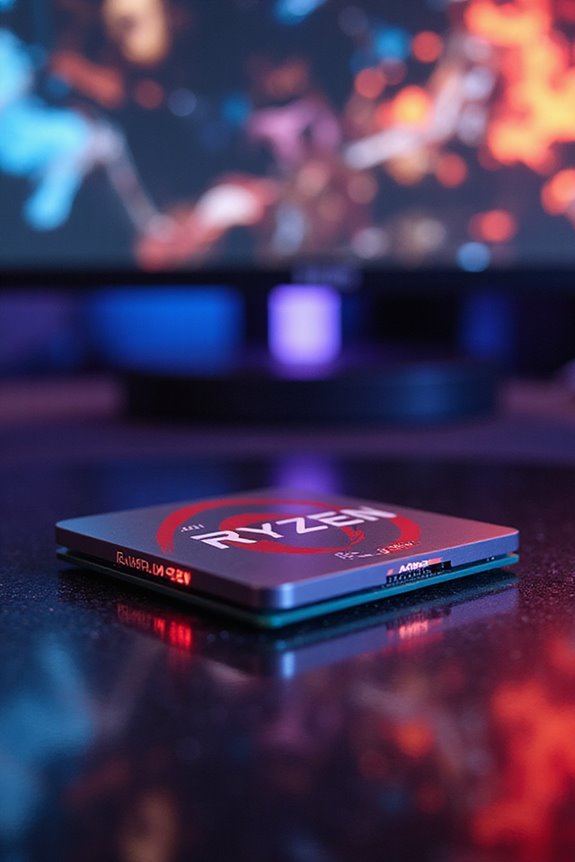
If you’re on the hunt for a CPU that balances performance and price, the Ryzen 7 7800X3D might just be your answer. Priced around $379.97, it gives you 8 cores and 16 threads, making it a solid choice for gaming and multitasking. With a base clock of 4.2 GHz and boosting up to 5.0 GHz, it competes fiercely with pricier models, often outperforming Intel’s Core i9-13900K in gaming scenarios.
Plus, it’s built on the Zen 4 architecture, supporting PCIe 5.0 and DDR5 memory, ensuring your system stays future-proof. While it’s great for rendering and video editing, remember, it might not be the absolute top performer for every single task. Still, it’s a fantastic value overall!
Upcoming Innovations in CPU Technology
As we look ahead to the future of CPU technology, it’s clear that exciting innovations are on the horizon. Intel’s Panther Lake, launching in late 2025, will feature the 18A process node and RibbonFET transistors, improving efficiency and performance. Meanwhile, Nova Lake is set for 2026, possibly utilizing TSMC’s 2nm process, which could enhance transistor density considerably.
I’m particularly intrigued by AMD’s Ryzen AI chips, showcasing remarkable benchmarks in AI tasks and 3D rendering. Plus, the integration of AI capabilities in CPUs like Intel’s Core Ultra promises to redefine performance, especially for gaming and creative workloads. These advancements hint at a future where efficiency meets groundbreaking power, and I can’t wait to see how they unfold.
The Best CPUs for Gaming and Creator Workloads
When diving into the world of gaming and creator workloads, finding the right CPU can make all the difference in performance and efficiency. For gamers, the AMD Ryzen 7 9800X3D is a standout, delivering unmatched performance in benchmarks. If you’re looking for value, the Ryzen 7 7800X3D offers excellent frame rates without breaking the bank. On the Intel side, the i7-14700K shines in mainstream gaming. For budget builds, the Core i5 12400F and Ryzen 5 7600 series provide solid performance without emptying your wallet. Creators should consider the Ryzen 9 9950X for its strong multi-threaded performance, while the i9-13900K excels in video editing. Just remember, high-end creator CPUs can come with a hefty price tag.
Frequently Asked Questions
How Does Overclocking Affect CPU Gaming Performance?
Overclocking really ramps up my CPU’s performance. I’ve noticed smoother gameplay and better frame rates. It’s like giving my games a much-needed boost, letting me enjoy every moment without frustrating slowdowns or lag.
What Cooling Solutions Are Recommended for High-Performance CPUS?
When choosing cooling solutions for high-performance CPUs, I recommend the Arctic Liquid Freezer III Pro for liquid cooling or the Noctua NH-D15 G2 for air cooling. They both balance efficiency and noise, ensuring peak performance.
Can I Upgrade My CPU Without Replacing My Motherboard?
Upgrading your CPU without swapping the motherboard is like adding a turbocharger to a car—it can boost performance! But I’d check compatibility first; verify your socket, generation, and cooling solutions align before diving in.
What Is the Importance of RAM Speed in Gaming Performance?
I’ve found that RAM speed really matters in gaming. It boosts performance, reduces lag, and enhances responsiveness. If you’re serious about gaming, consider investing in faster RAM for a smoother experience. It’s worth it!
How Long Can I Expect My CPU to Last With Heavy Gaming?
Did you know a high-end CPU can last 7 to 10 years with proper care? If you’re gaming heavily, keeping it cool and well-maintained can really make a difference in its longevity. Trust me.

